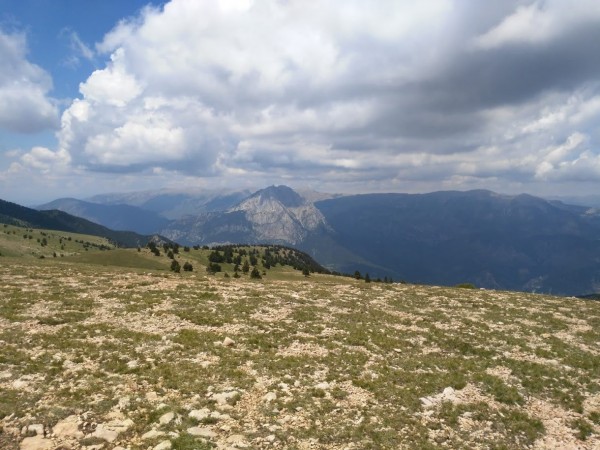What are the specific temptations of the Lent that we have just started?

Every year on the first Sunday of Lent we read the account of Jesus’ temptations in the desert. This past Sunday we read Mark’s version, which is much more succinct than the more elaborate ones of Matthew and Luke: «At that point the Spirit sent Jesus out toward the desert. He stayed in the desert forty days, tempted by Satan; he was with the wild beasts and angels waited on him» (Mk 1: 12-13). It is, without a doubt, a symbolic account that anticipates the entire life of Jesus. We could compare it to a cinematic trailer, when in one or two minutes we are given an overview of the entire film that will soon be released: in an instant we see the faces of the main characters and we capture the "flavor" of the story that then it will be explained to us in detail. In the “trailer” of the gospel that Mark gives us, we discover that the whole of Jesus’ life (represented by the forty days) he was driven and inspired by the Spirit that had descended on him on the day of his baptism; that his whole life was a journey through the desert (the desert of so much incomprehension that he had to endure); that he was constantly tempted (how many times did Jesus consider throwing in the towel and abandoning his mission?); and that he always lived surrounded by beasts (his many adversaries, from the Pharisees to the high priests of Jerusalem) and served by angels (those who helped him in his mission, from his disciples to the friends who welcomed him into their homes, like Martha, Mary and Lazarus).
What is particular about this story is that Mark does not specify what the temptations were. Unlike Matthew and Luke, who will talk about turning stones into bread, about power and glory, or about putting God to the test with Jesus' gesture of jumping from the parapet of the temple, here we are simply told that Jesus «was tempted.» And this helps us to understand that there are many temptations, that everyone has their own, and that we would always do well to ask ourselves what ours are.
In this sense, there may be some specific temptations for us during this Lent.
It is now a year since the beginning of the Covid-19 pandemic, and twelve months later we are still immersed in it. Does not this context create the conditions for particular temptations? We think so—and we should probably examine them.
First, the temptation to give up. Tired, fatigued by the bad news, by so much pain lived and shared, by so much anxiety and uncertainty, perhaps the first temptation we must face, today more than ever, is that of discouragement—the temptation to stop fighting for the future of our families and to stop yearning for a tomorrow that may be attractive and worthwhile living.
The second may be the temptation to think, in the face of so much pain, that others exist only to serve me: that, somehow, my suffering is more serious and real and deep than yours. And, then, to forget that we are called to be these angels that the gospel spoke about—in any circumstance, whether there is a pandemic or not: to be ready to serve others. It is the temptation to forget about service. To give up being angels.
Then there is the temptation to become wild beasts. Hunted by the difficult and complicated context of the pandemic, we may feel justified to lose decency, respect, kindness, and behave in ways that, prior to the pandemic, would seem unacceptable to us. As if, in these uncertain times, everything would be allowed. In fact, many places have already been experiencing an increase in crime these last months. It is an effect of the crisis that we are experiencing, when some, in the midst of so much need, may assume that it is logical and acceptable to abandon the values that they previously held, and begin to live according to the law of the jungle .
The last temptation of the present time that we will mention (there could be more) is to turn social distancing into emotional and affective distance, and home confinement into mental isolation. There is no question that we must continue to practice all measures of prudence to take care of ourselves. Yet, we must also ensure that social distancing does not lead us to emotionally distance ourselves from others, and that confinement does not lead us to enclose ourselves in our little world of worries, forgetting that, beyond our homes, out there, there is a world of needy people.
Assuming that these may be some of the temptations that may haunt us during this Lent may be the best way to overcome them.

In the Catholic Church it is traditional to encourage people to make some special sacrifice during the season of Lent, this time that we started this week with the celebration of Ash Wednesday. There are those who decide that while Lent lasts they will give up sweets, or smoking, or alcohol. It reminds me of the sacrifices my mother made when she was little: she put stones in her shoes and tied a tight rope around her the waist, things like that. I don't know how long it would last, certainly not long, and that perhaps these were girlish things, but when she told me about it, I didn't quite understand the notion of sacrifice that these practices entailed. As a teenager, I decided that this was not for me, that God was not asking me to perform these sacrifices.
Sacrifice is a ritual, and as such it has its content and its spirituality, and although in my adolescent rebellion I did not see it, rituals are part of life, more useful and valuable for some than for others. As a friend used to say, making a Lenten effort of self-discipline, even in eating or drinking, is not bad, since it shows that you can exercise your will over your body.
Another friend shared the reflection that the liturgical cycles of the Church are not always lived in the year, but that our lives have stages of each cycle: stages of sacrifice, reflection, containment, such as Lent, stages of sadness and mourning, like Good Friday, and stages of new life and joy like Easter Sunday. It is also true that, with the pandemic, we are living a long period of moderation in many ways, of containment, sadness, and pain. So, there is sacrifice, like it or not!
This year, in the days leading up to Lent, I was planning to carry out a double purpose, my personal “sacrifice”, and I share it with you.
On the one hand, I have decided that when I start a dialogue about politics, or religion, or economics, from the beginning I should be willing to learn what another person can teach me; be willing to modify my opinion, or even change it. That would be a real dialogue. Because if I come to the dialogue with all my firm and immovable ideas, what dialogue will that be? Recently the bishop of Madison, Donald J. Hying, sent a letter to all the priests of his diocese warning of the disunity and polarization that exists today in the Catholic Church in the USA. It would seem that now there are "Trump Catholics" and "Biden Catholics," Hying says. In his letter he states that any moderate opinion and any attempt to reach an intermediate position is now seen as a betrayal of the truth. “The painful experience of these past months tells me that we as fallen human beings can become divisively tribal. We instinctively associate with the people who think, act, and live as we do. ” Along these lines, I repeat the first purpose: to start any dialogue with a sincere attitude of openness to the other, being willing to change your mind, to understand, to empathize with other points of view.
On the other hand, I have a similar purpose, but more in line with judging people -rather than their opinions. In daily interactions with others, we find a thousand reasons to judge negatively not only an idea or a political position, but an action, a feeling, an emotion. My proposal for this Lent is to generate empathy looking for a virtue, something positive, in all those with whom I interact. Every time a negative judgment about someone assails me, I will search until I find a virtue, a gift, a quality, an ability that that person has and is worthy of praise or even imitation. Thus, my judgments (although I know that, in fact, I should not judge at all) will be more balanced and empathetic with the other person.
In conclusion, my two-fold purpose for this Lent is to build bridges of union with others: bridges between my opinions and those of the other people, and bridges of empathy with the feelings and actions of others, thus balancing the possible negative judgments with the positive ones. Piece of cake, right? Have a great Lent!

Just as in Advent we prepare for Christmas, Lent is also a time for preparation. Lent is a time for reflection, time for analysis, time for honestly valuing our attitudes, our decisions, our commitment.
It is time to talk with ourselves and with God in prayer, sincerely, honestly, without cheating ourselves with excuses, or justifying our actions. It is time to recognize who we are without fear; of looking ourselves in the mirror, even though sometimes we may not like what we see.
We know that God does not punish, that He is always merciful. Let’s not be afraid, then, to recognize who we really are, remembering that we are all in the same boat. We are not divided in “good ones” versus “bad ones”, pure and impure, first or second-class citizens. We all share the same human condition, and through it we are all capable of acting generously and make the world a better place.
Likewise, we all have our miseries, our selfishness. Each one of us must discover these two dimensions. If I only see the negative aspects of myself and nothing positive, I will have to look deeper into my heart, and learn how to be kind to myself. On the other hand, if I only see my own qualities but it is hard for me to see also my miseries, I am deceiving myself and I fail to see myself honestly. Sometimes we need other people who with love, understanding and respect will tell us what we should improve in our lives, especially those who live with us and know us.
We invite you, then, to live Lent as a time of reflection, not to be depressed or full of despair as we face our own selfishness or those of others, but as a time to get ready so that when Easter comes, when we celebrate that Life has conquered death through Jesus’ Resurrection, we can do it in a healthy manner, accepting our virtues in order to strengthen them, and also our weaknesses so that it may be easier to address them.
Happy Lent!

The word for Lent in Spanish is Cuaresma, which comes from the Latin Quadragesima; that is, forty in ordinal numbers. That is because Lent (or Cuaresma) has as a direct root the forty days that Jesus spent in the desert fasting. The Church’s celebration of Lent is a tradition that goes back centuries. Nevertheless, with time and because of the idiosyncratic nature of the Church around the world, there is a biblical element that is an essential part of Lent that sometimes is left behind: Baptism. To see this clearly, we must go to the Gospel readings during this Lenten season.
There are several key Gospel readings for Lent, the first of which is the focus on Ash Wednesday. Every year, the reading is from Matthew, no matter the cycle. From there we have the three distinct practices of Lent: fasting, prayer, and alms-giving. And we are also reminded how we are to fast, pray and give alms. Jesus says: Take care not to perform any of these deeds that people may see them! (c.f. Matt. 6:1). The Gospel for the first Sunday of Lent does change according to the cycle, but they each focus on the same event in the life of Jesus: the temptations of Jesus during his forty days in the desert. Likewise, the reading for the Second Sunday also changes but focuses on the Transfiguration. With this common foundation, we then have different Gospel readings taken from John and Luke for the Third, Fourth, and Fifth Sundays.
Having the context of the readings, let us return to the First Sunday of Lent. Here, we will find ourselves with a very well-known passage in the Bible, that of the temptations of Jesus. In all of the Gospel traditions, we find that the reason why Jesus goes to the desert has to do with the Spirit. In Matthew, Jesus “was led up by the Spirit into the wilderness to be tempted by the devil.” (Matthew 4:1). Luke writes that “Jesus, full of the Holy Spirit, returned from the Jordan and was led by the Spirit in the wilderness, where for forty days he was tempted by the devil,” (Luke 4:1-2a). And finally, what we will hear this year in Mark: “And the Spirit immediately drove him out into the wilderness. He was in the wilderness forty days, tempted by Satan…” (Mark 1:12-13a). No matter the Gospel, the Spirit leads or drives Jesus out into the wilderness to be tempted.
Of course, this is not the first appearance of the Spirit; it has been introduced just before at the narrative of Jesus’ baptism. If we read Mark carefully, we find the adverb immediately, suggesting that the temptations are an urgent step for Jesus right after the baptism. In other words, the Spirit that Jesus received during his baptism, the one who came down as a dove, will produce this quick movement into the wilderness.
This shows a direct relationship to Baptism and facing temptation. At the baptism of Jesus, there is a voice from heaven that says Jesus is the beloved Son of God. And when we read the temptations, described in detail by Matthew and Luke, we realize that two of them start with the interrogative sentence “if you are the Son of God…” The voice of the tempter is in diametrical opposition to that of God. The temptations of Jesus in the desert, while provoking him to use his divine power to personal benefit and for the sake of display, are at their core the same temptation: to demonstrate that he is indeed the beloved Son of God. The tempter is putting the voice heard at Jesus’ baptism in doubt. The moment Jesus acts on the temptations, he already doubts the voice from heaven. It is then reasonable to believe that the Spirit that Jesus received at his baptism has driven Jesus into the desert to fasten his identity as the beloved Son of God; so that the love of the Father would never be put into doubt throughout his mission on the way to the cross.
I would suggest that the reaffirmation of our identity as beloved sons and daughters of God should be precisely one of the primary purposes of these forty days we call Lent. Our Baptismal Identity is crucial to understanding why Lent even exists. It is true that during Lent we practice penance as a way to be prepared for the Easter celebration. But while penance is necessary, it is not the first or only step in our Lenten preparation. Again, an essential part of Lent is to remind ourselves that we are beloved sons and daughters of God, and our acts of penance should direct us towards an experience of this.
As mentioned before, we will hear that voice again from Jesus' baptism during the Second Sunday of Lent. At the moment of the Transfiguration, a voice from heaven will remind the disciples: this is my beloved son. So, this Lent let us not forget our Baptismal identity. Before we rush to do penance, let us first evoke our identity as children loved by God. In doing so, our penance will be more profound, dynamic and fruitful.
Today, Ash Wednesday, we begin Lent, and we begin this time hearing a call that describes in a clear and convincing way the ideal of Jesus with reference to solidarity with those in need. “When you give alms, do not let your left hand know what your right is doing, so that your alms may be done in secret. And your Father who sees what is done in secret will reward you.”
Proximity to the poor and commitment to alleviating human suffering form part of the essence of Christian thought. Pope Francis continues to emphasize this with words and closeness to the “the least of our brothers”, the ones discarded by the society of success in which we live. The commitment to the poor must be fulfilled through tangible and real actions on behalf of our fellow man, the people around us, and in the world, who suffer from material and spiritual scarcities. We must go further than a theoretical discussion of good intentions.
For years, we, the Community of Saint Paul, have been promoting volunteer work as well as accepting much needed monetary donations in order to be able to accomplish the aid and development projects to which we are committed in Bolivia, Colombia, Mexico, the Dominican Republic and Ethiopia. Volunteer groups come to collaborate in different ways with us: some volunteers work in professional capacities, such as doctors, ophthalmologists and educators. Others bring material goods for those in this world who have the least...the people who fall in the ever widening social gap between the rich and the poor.
However, it is necessary to remind ourselves again and again of Jesus’ teaching that our left hand does not know what our right hand is doing. In a world that relies heavily on social media for communication and measuring results, many people and charitable institutions feel pressured to show what they have achieved as a result of their collaboration or gifts. Photo exhibitions, testimonials and data related to charitable actions generate satisfaction among volunteers and donors for having been able to contribute to change. They calm wounded consciences faced with the flagrant social injustices which we all witness.
As we begin Lent, Jesus challenges us to do good, but... to do it silently, in a discreet way, even anonymously, without the need to show anyone the results that we have achieved. Free selfless assistance doesn’t only benefit the people whom we help. It also teaches us to live the values of humility and discretion. We learn to distance ourselves from the limelight in a world accustomed to exhibiting and recognizing every action that is undertaken, including charitable initiatives. Let’s think about the challenge Jesus presents to us today: can my right hand live without knowing what the left one is doing?
Ricardo Martín
Ash Wednesday inaugurates a new season of Lent. Lent can become an anecdote, a missed opportunity, if we do not become very intentional about it. The forty days of Lent are an invitation to change.
When Jesus calls us to “metanoia” he is not only calling us to “repent” (as we will hear when a cross of ashes is drawn on our foreheads), but also to change. Metanoia means change, change of heart, conversion (if you prefer a more religious language.) Repentance seems to be only one step in the process of change, and it connects directly with sin when we may be asked to change things that are not necessarily sinful. Repentance also seems to reflect about the past, a past action, and change is a reference to a hopeful future.
Change is difficult, we know. It is especially difficult if we do not count on God’s grace and we only trust our human power. To help us further, the Church gives us the three Lenten observances. They are wonderful tools to begin and develop our own metanoia. They come directly from the gospel that we read today: prayer, fasting, and giving. We need to be intentional about these three practices if we want them to be fruitful.
The kind of prayer described in the gospel today is a silent, individual prayer. It is not a prayer of intercession, when we ask for something; or a prayer based on formulas that we all know. It is a prayer of quieting ourselves and our minds to be able to listen to what God is trying to communicate to us. We will have to be intentional about it, find a time and a place, and enter into a rhythm during the season.
Fasting is a symbol of an attitude, and out of the three observances, the one we may misunderstand the most. Fasting begins with the realization that we do not need that much, that we have to empty ourselves of the obsession with the self and our perceived needs. If we are just about the dry observance of the rule, fasting only applies to two days during the season: Ash Wednesday and Good Friday. But fasting applies to the whole season. We need less of everything. We need a radical emptying of our own needs, so we make room for God and others.
Fasting in modern times has been adapted into some “Lenten give-up.” It may be good, especially if we see it just as a symbol of a deeper change (I read some place that Lent should be less about giving up and more about giving out!) It is certainly not about “giving up something and then patting ourselves on the back for our self-control” (as a friend of mine put it).
Lent, and the change that Lent invites us to initiate is much more than giving up chocolate or sweets. Ask someone who loves you what you should really give up. I guarantee you they will not say chocolate.
Fasting is connected with the last Lenten observance. The origin of (alms)giving is that we save money with what we give up in material terms (the chocolate, for instance) and then we give this money to the poor. So our giving up is not self-serving; our sacrifice does improve someone else beyond ourselves. There is a lot of change needed in the way we consider and treat the poor, and we may be far from trusting God’s promise that when we give sacrificially we receive all kinds of blessings. We need change in the way we give, also—and more about that during Lent.
A cross of ashes will be stamped on our foreheads as a sign of our willingness to enter into this season of transformation. We prepare ourselves for the upcoming celebration of the Passion, Death and Resurrection of Christ, by praying for God’s grace to transform us into individuals more like the Jesus who lived and died for us. Happy Lent!!



